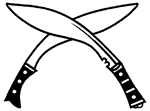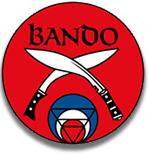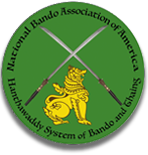
The word “BANDO” (pronounced “Bawn-Do”) is a multi-faceted martial art system, with roots in China, Burma, and India. Various etymologists express their views toward the word differently. Some say that it originated from the Chinese, while others claim that it came from India, and then there are those who propose that it can be traced back to Tibet.
The word “Bando” has been used in place of the concept of “THAING” or “BAMA THAING” for easy pronunciation and identification. The word BANDO is easily pronounced similar to the words Budo, Judo, Aikido, Karate-do, Tae Kwon Do, etc.
There are also numerous interpretations of the term “Bando”. Different linguistic and ethnic groups define and interpret the word differently, and often some Bando schools emphasize only one aspect of the Bando Discipline, such as that of an empty-hand system.
Generally, the term “Bando” means:
- The Way of Disciplined Warrior
- A System of Self-Defense
- The Art of Empty-hand Fighting or Combat
Bando is not Karate. The karate-like techniques of striking, kicking and butting are but a few of the aspects of the Free Hand Weapon of the Bando Discipline. Other aspects of the Free Hand Weapon of the Bando Discipline include grappling techniques of throws, trips, flips, holds, locks and chokes. In Myanmar [Burma], the Free Hand Weapon is traditionally called “Bando”. Additionally, there are the aspects of the other Weapon Hands of the Bando Discipline- traditionally called “Banshay”, such as stick fighting, sword fighting, knife fighting, spear fighting, gun fighting and combat archery. Both traditional “Bando” and “Banshay” are combined for our purposes into the Bando Discipline.
The Bando system is defined as the following subsystems:
- DHOE (empty hand) – Lethway (Kick-boxing), Free-fighting
- DHOT (stick hand) – Dhot Shay (long staff), Pongyi Dhot (medium Staff}, and Dhot Lay (short stick
- DHA (sword hand – Min Dha (long sword), Kukri (medium sword), and Dagger (short sword)
Traditionally, Bando students are encouraged to learn and develop knowledge and skill in at least 3 areas, one from each subsystem. Instructors strongly encourage their students to attend National Bando clinics and seminars to expand their knowledge on the different sub-systems of Bando. Studying only one sub-system is inadequate and restrictive.
As the old Bando saying goes, “One Finger Does Not Make the Fist.”
*********
“As no one nation or people have the monopoly of the sunlight.
No one system, school or doctrine has the monopoly of the TRUTH”.
– Bando Motto


